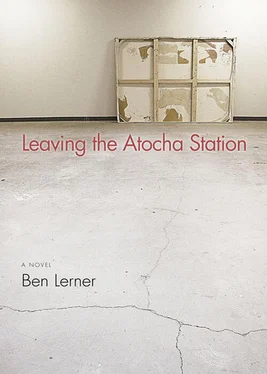I walked to another group of photographs and saw that they were Abel’s idle machines, but much smaller than the photos in the gallery.
“You don’t like them,” she said, handing me a drink involving whiskey.
“They don’t do much for me,” I said in English. She squinted, maybe because of what I said, maybe because I’d once again used English.
“Make yourself at home,” she said in English, as if quoting a movie, and I sat on the couch and the cat and I considered each other suspiciously. I asked if I could smoke, a silly question, and she indicated the ashtray and sat beside me and we both lit cigarettes. She walked with her cigarette and drink to a closet and somehow drank and smoked and changed her clothes in front of me without burning or spilling anything and without it seeming like a striptease.
“That’s amazing,” I said, vaguely.
She smiled as though she understood what I was referring to and sat back down beside me. I asked her if she knew anybody who died in the bombings. She said no. She said many of the dead were immigrants. She said that it was a crime against working people and that she didn’t know many working people. Do you, she asked, and I thought for a while, then said I wasn’t sure. She launched into a very detailed and, so far as I could tell, sophisticated projection of the political ramifications of the bombings. She was sure ETA had nothing to do with it. I didn’t say anything. She went to a stereo I hadn’t noticed and put on music.
The music filled the room and for a moment, maybe two measures, I felt intensely present. She said she should go back but that there was food and drink and clean towels. She had noticed I had smoked my last cigarette and pointed to a pack on the desk. She kissed me good-bye on the lips but it did not feel like an event.
When I was alone in the apartment I walked to her closet and looked through her clothes. I smelled one or two of the hanging dresses. There was a dresser inside the closet and I opened and shut the drawers. Then I went into the bathroom and looked around. Everything was spotless and I wondered if she cleaned it herself. Maybe an immigrant cleaned her apartment, an immigrant who’d been blown apart. There were a few bottles of pills behind the mirror but I couldn’t tell what they were. Then I rolled a strong spliff with the last of the hash from my bag and smoked it on the balcony. When I was finished I took off my shoes and lay down on her bed. In the stack of books nearest her bed I saw a small poetry magazine from the U.S., an issue in which I was published. I was astonished that a tiny magazine published in New York featuring poems I had written in Providence about Topeka was here, in this gorgeous apartment in Madrid. Not that poems were about anything. Then I remembered I had given her the magazine. I removed it from the stack, knocking the stack over, and found my poem:
Possessing a weapon has made me bashful.
Tears appreciate in this economy of pleasure.
The ether of data engulfs the capitol.
Possessing a weapon has made me forgetful.
My oboe tars her cenotaph.
The surface is in process.
Coruscant skinks emerge in force.
The moon spits on a copse of spruce.
Plausible opposites stir in the brush.
Jupiter spins in its ruts.
The wind extends its every courtesy.
I have never been here.
Understand?
You have never seen me.
__________________________
I wasn’t sure if Teresa had slept in the bed with me; there were sleeping bags and pillows on the floor, but they might have been Arturo’s or Rafa’s, neither of whom was in the apartment now. The sleeping bags made me think of body bags lined up beside the tracks, although I hadn’t seen that yet. I had confused memories of people entering the apartment when I was half-asleep, snatches of their drunken conversation, the smell of marijuana, maybe a body next to me, breathing. Teresa was on the phone, speaking quietly so as not to wake me. I would not be able to ask her if she had slept in the bed; if she did, that would constitute a new level of intimacy and I could hardly admit I had no memory of it. For all I knew we’d kissed and fooled around; while I doubted that, I could imagine it in a way that felt like remembering.
The cat was still on the red couch, blinking. Although I had not made a noise or moved, Teresa knew I was awake, and brought me, phone tucked between ear and shoulder, an espresso; I hadn’t heard the machine. I couldn’t read her smile. I couldn’t believe how good the coffee was. She went back to her desk and I sat up and finished the coffee and tried to listen to her conversation; she was saying something about making or receiving a delivery; maybe she did real work for the gallery. After my coffee I went into the bathroom and turned on the shower and shat and took one white pill and then stepped into the shower. The showerhead was elaborate and could be adjusted so as to texture the water in various ways. Somehow the showerhead, more than any other object in the apartment or the apartment itself, made me feel that Teresa’s wealth was limitless. I realized I had not had water to drink, only coffee and alcohol, for what felt like an alarmingly long time. I opened my mouth and let it fill with water and swallowed.
I put on the same clothes and came out of the bathroom to find Teresa dressed, smoking and drinking her coffee on the red couch. She smiled at me, the cat blinked at me, and I said to her in English, “Everything here is beautiful. You are beautiful. The shower is beautiful. The coffee. How did you know I was awake? How was the beautiful coffee suddenly ready?” I sounded like I was translating from Spanish. “Why does everything in the apartment, from a pile of books to those papers on your desk, seem so beautifully arranged? How is it that your cat communicates so much intelligence, that it blinks so significantly?”
“Why are you speaking English?” she asked in English, widening her eyes.
“I don’t know,” I said in Spanish. Then I repeated in Spanish, to the best of my ability, everything I had just said about her, her dexterity, the shower, the coffee. She laughed at this but also looked a little sad. Then she said I must have really needed my sleep, that I’d slept deeply and for a long time. I wondered how she’d gauged its depth, if she’d tried to stir me. I did feel rested. The light in the apartment looked postmeridian.
“We should go to the protests,” she said. I blinked at her and she explained: “There are protests at the PP headquarters. The PP was blaming ETA when it knew it wasn’t responsible. People are furious,” she said.
“Are you furious?” I asked.
“Arturo texted me,” she said, ignoring my question. “He said there is a huge protest in front of the headquarters. A short walk from here.” Then in English: “It’s history in the making.”
“If I hadn’t woken up,” I asked her with something strange in my voice, maybe anger, “would you have woken me or gone without me or just not gone?”
“I don’t know,” she said. “You woke up.” Her eyes were wide again.
We left the apartment, walked a few blocks, and before we saw the crowd, we heard it, chanting about truth and lies and fascism. Police in riot gear stood between the crowd and PP headquarters. The crowd was young and angry and we joined them. Teresa, to my surprise, blended in gracefully, taking up the chant, although I couldn’t pick out her voice particularly, and pumping her fist in the air with the rest of the crowd without any of it seeming affected or silly. People were banging on drums and pots and pans and I followed Teresa deeper into the crowd. Finally I could go no farther and she disappeared in front of me. I felt she knew she’d lost me, and wondered if she was responding to my standing still at the protests the previous day. A police officer said something on a megaphone and the chants intensified. I thought the building might be stormed, but it wasn’t. I slipped back out of the crowd and crossed the street and watched the protest from there. For a second I thought I saw Isabel.
Читать дальше












